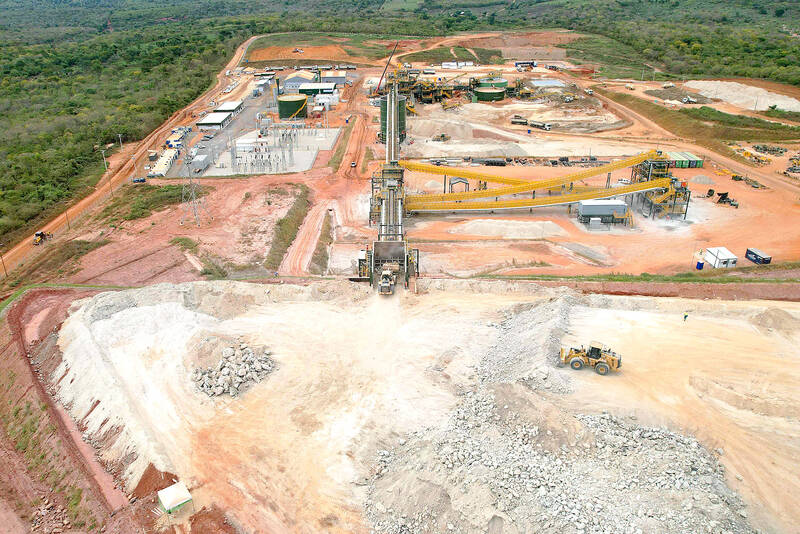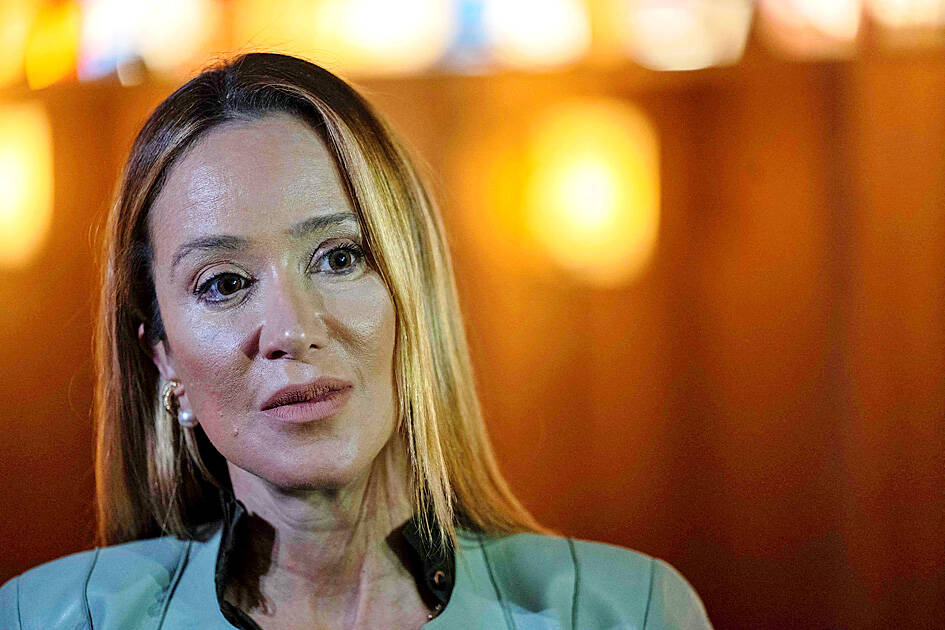In a cloud of gray dust, a heavy-duty excavator loaded a truck with stone blocks containing lithium, the “white gold” of the clean-energy revolution, which some hope would transform this parched, impoverished region of Brazil.
Sun-scorched and drought-prone, the Jequitinhonha Valley, in the southeastern state of Minas Gerais, is one of the poorest places in the country.
However, the region, nicknamed “misery valley,” is on the cusp of a boom: It is home to about 85 percent of the lithium reserves in Brazil, the world’s fifth-biggest producer of the metal, an essential ingredient in electric vehicle batteries.

Photo: AFP
Authorities in the region are eager to tap the potential of the silvery-white metal.
Last month they threw a fanfare-filled event at the NASDAQ stock exchange’s headquarters in New York, where they launched an initiative to attract investment to what they are calling “Lithium Valley.”
However, not everyone is thrilled at the idea.

Photo: AFP
Some residents in the region of about 1 million people complain about the environmental impact of lithium mining, others that local communities are not being included.
“This is the Jequitinhonha Valley... They want to call it ‘Lithium Valley.’ But let’s not put mining interests before our people’s identity,” said Aline Gomes Vilas, 45, a local activist in the town of Aracuai.
Ana Cabral-Gardner, chief executive of Canadian mining firm Sigma Lithium, is keen to respond to such criticism.
Her company, which started mining in the valley in April, is among the first to tap its lithium reserves.
Its goal is to produce more than 600,000 vehicle batteries’ worth of the metal in its first year, eventually scaling up to three times that amount.
Sigma calls itself a “green lithium” miner, and emphasizes its social and environmental credentials.
Lithium mining is notoriously water-intensive, a problem given that the metal is typically found in water-poor regions.
Cabral-Gardner, who is Brazilian, said her company reuses 90 percent of its water supplies, protects the local stream and uses no chemicals in the mining process.
“Our entire operation is built around finding a balance between sustainability and mining,” she told reporters. “I’ve been called the ‘hippie CEO.’”
In Aracuai, which sits near Sigma’s mine, Gomes Vilas said it is already having a negative effect, including damage to people’s homes from explosions used in the mining process.
“This was a peaceful rural area. Now there’s a constant racket. There are already houses with cracks in the walls from the explosions,” she said.
“The whole house shakes every time there’s an explosion,” added Luiz Gonzaga, a 71-year-old farm worker who lives next to the mine. “They’re digging pretty far from me for now, and the dust is already bothering us. Imagine what it will be like when they start digging closer.”
Brazil, a country with a history of rapacious resource booms and busts, needs to ensure communities like this benefit from lithium mining, advocates have said.
“The Jequitinhonha Valley has been through a gold rush, a diamond rush and it never brought development,” said Ilan Zugman, Latin America director for environmental group 350.org.
“We obviously believe the clean-energy transition needs to happen, but it should be fair and inclusive for local communities,” he said.
So far, the lithium mined in Brazil is almost entirely exported — not a good sign, said Elaine Santos, a researcher at Sao Paulo University.
“Look at Europe and the United States: They have a strategy to develop the entire value chain of electric cars, from mining to vehicle production,” she said.
“Brazil’s policy is still very limited... Brazil risks deepening its dependency as a country that just exports raw materials, with little added value,” she added.

In the sweltering streets of Jakarta, buskers carry towering, hollow puppets and pass around a bucket for donations. Now, they fear becoming outlaws. City authorities said they would crack down on use of the sacred ondel-ondel puppets, which can stand as tall as a truck, and they are drafting legislation to remove what they view as a street nuisance. Performances featuring the puppets — originally used by Jakarta’s Betawi people to ward off evil spirits — would be allowed only at set events. The ban could leave many ondel-ondel buskers in Jakarta jobless. “I am confused and anxious. I fear getting raided or even

POLITICAL PATRIARCHS: Recent clashes between Thailand and Cambodia are driven by an escalating feud between rival political families, analysts say The dispute over Thailand and Cambodia’s contested border, which dates back more than a century to disagreements over colonial-era maps, has broken into conflict before. However, the most recent clashes, which erupted on Thursday, have been fueled by another factor: a bitter feud between two powerful political patriarchs. Cambodian Senate President and former prime minister Hun Sen, 72, and former Thai prime minister Thaksin Shinawatra, 76, were once such close friends that they reportedly called one another brothers. Hun Sen has, over the years, supported Thaksin’s family during their long-running power struggle with Thailand’s military. Thaksin and his sister Yingluck stayed

Kemal Ozdemir looked up at the bare peaks of Mount Cilo in Turkey’s Kurdish majority southeast. “There were glaciers 10 years ago,” he recalled under a cloudless sky. A mountain guide for 15 years, Ozdemir then turned toward the torrent carrying dozens of blocks of ice below a slope covered with grass and rocks — a sign of glacier loss being exacerbated by global warming. “You can see that there are quite a few pieces of glacier in the water right now ... the reason why the waterfalls flow lushly actually shows us how fast the ice is melting,” he said.

RESTRUCTURE: Myanmar’s military has ended emergency rule and announced plans for elections in December, but critics said the move aims to entrench junta control Myanmar’s military government announced on Thursday that it was ending the state of emergency declared after it seized power in 2021 and would restructure administrative bodies to prepare for the new election at the end of the year. However, the polls planned for an unspecified date in December face serious obstacles, including a civil war raging over most of the country and pledges by opponents of the military rule to derail the election because they believe it can be neither free nor fair. Under the restructuring, Myanmar’s junta chief Min Aung Hlaing is giving up two posts, but would stay at the